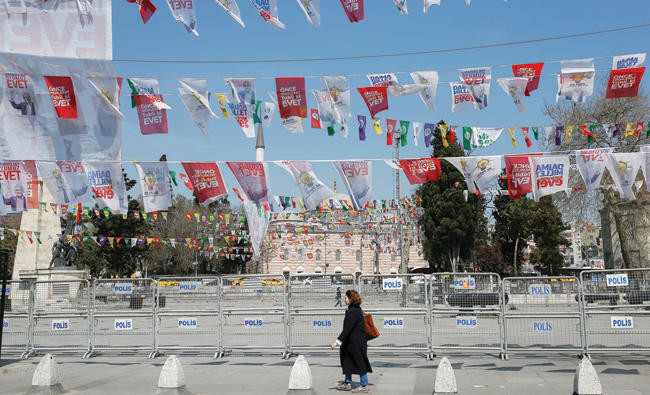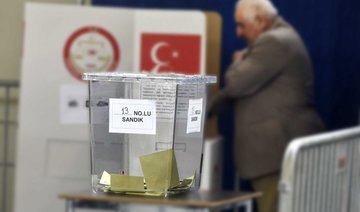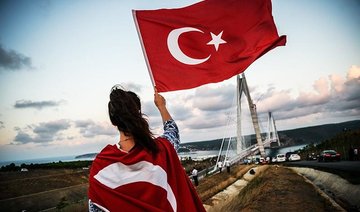ISTANBUL: Turkey votes on Sunday in a referendum on expanding the powers of the presidency under Recep Tayyip Erdogan. But the outcome could more broadly influence all aspects of the country’s future. Coming 94 years after the foundation of modern Turkey by Mustafa Kemal Ataturk, the referendum is a landmark vote that may affect relations with the West, a peace process with Kurds and dynamics inside society.
Here are five ways the referendum could shape Turkey:
• If he wins the referendum, Erdogan will enjoy enhanced powers, be able to appoint ministers and have an entire bureaucracy centralized within his presidential palace. Opponents worry that the new system will lack the “checks and balances” that mark the US system, moving the presidency toward one man rule.
The new system would be implemented from November 2019 when presidential and legislative elections would be held simultaneously.
With the clock wound back under the new system Erdogan, who became president in 2014, could take two more terms, allowing him to stay in power until 2029 rather than 2024, currently.
The executive presidency system “amasses unprecedented power in the hands of one man,” said Alan Makovsky, senior fellow at the Center for American Progress.
Erdogan in combative speeches has not countenanced the prospect of a “No” vote and not given the slightest indication he would consider his future. But given the advantages of the “Yes” campaign a “No” would be a massive blow to his status as Turkey’s all-powerful leader.
• Relations between Turkey, a longstanding candidate to join the EU, and its EU partners plunged to bitter lows during the referendum campaign as the president lashed out at Europe for what he said was behavior reminiscent of Nazi Germany.
Erdogan has said Turkey’s membership bid would be “on the table” after the referendum and in every single campaign speech said he would sign any bill restoring capital punishment, a move that would automatically end its bid to join the bloc.
“The tactics of constantly bullying the EU... for domestic political purposes have now reached their limits,” said Marc Pierini, visiting scholar at Carnegie Europe.
In the event of an easy “Yes” victory, Erdogan could have the confidence to take a decisive move away from EU integration and show Turkey can forge alternative strategic alliances, including with Russia.
One alternative to full membership could be a strengthened customs union, but it is unclear if that would be palatable for Erdogan.
• Erdogan was the first Turkish leader to undertake peace talks with the outlawed Kurdistan Workers’ Party (PKK), resulting in an unprecedented cease-fire.
But the PKK truce shattered in 2015 and Erdogan has since waged a controversial campaign to destroy the group. In the event of a “Yes,” it is not excluded that Erdogan could adopt a more reconciliatory attitude on the “Kurdish problem,” even to the point of reopening dialogue.
“In the case of a narrow “Yes” win, he (the president) may feel compelled to be conciliatory,” said Asli Aydintasbas, senior fellow at the European Council on Foreign Relations (ECFR). “Turkey could return to the peace process.” Yet the Yeni Safak daily has claimed that the government will open a new front with cross border operation against PKK camps in Sinjar, northern Iraq, in a new effort to destroy the group.
• Turkey’s hugely diverse society has starkly polarized during Erdogan’s tenure as prime minister and president since 2003. Erdogan has frequently demonized opponents, saying those who wanted to vote “No” were playing into the hands of the PKK and US-based Muslim cleric Fethullah Gulen, blamed for the failed July 15 coup.
“He wins, but in the end half of the country is in love with him, and the other half loathes him, and herein lies the crisis of modern Turkey,” said Soner Cagaptay, author of a forthcoming book, “The New Sultan.”
While Erdogan has forged a coalition with nationalists, he has in the past showed considerable pragmatism in his alliances.
• Markets are cautiously expecting a “Yes” and hoping this will bring much needed stability. A rally in Turkish assets is expected in the event of a “Yes.” In the medium term the prospects are much more uncertain, with some economists fearing that any democratic deficits in Turkey and increased polarization in society, coupled with the government’s loss of its enthusiasm for reform, will hit long term growth rates.
“While a potential “Yes” may be cheered by the market in the near term, Turkish equities are not likely to trade above historical averages as growth remains subdued and the long term implications of the system untested,” said economists at BGC Partners in Istanbul.
5 ways the vote could change Turkey
5 ways the vote could change Turkey

France in communication to maintain Hezbollah-Israel ceasefire, Lebanese statement citing Macron says

CAIRO: French President Emmanuel Macron told his new Lebanese counterpart Joseph Aoun in a phone call that he is in communication to maintain the ceasefire between Hezbollah and Israel, according to a statement by the Lebanese President’s office on X.
Aoun asked Macron to oblige Israel to implement the agreement to preserve stability.
The phone call comes after the Israeli army on Saturday warned residents of dozens of Lebanese villages near the border against returning until further notice, a day after Israel said its forces would remain in south Lebanon beyond a Sunday deadline for their departure under the US-brokered ceasefire that ended last year’s war.
70 freed and ‘deported’ Palestinian prisoners reach Egypt

- According to Israeli list, more than 230 Palestinian prisoners to be released under the deal are serving life sentences
- They will be permanently expelled from the Palestinian territories upon their release
CAIRO: Seventy Palestinian prisoners arrived aboard buses in Egypt Saturday after being released from Israel as part of a Gaza ceasefire deal, state-linked Egyptian media reported.
Al-Qahera News, which is linked to state intelligence, said the prisoners were those “deported” by Israel, adding they would be transferred to Egyptian hospitals for treatment.
According to a list previously made public by Israeli authorities, more than 230 Palestinian prisoners to be released under the deal are serving life sentences for deadly attacks on Israelis, and will be permanently expelled from the Palestinian territories upon their release.
Broadcasted footage on Saturday showed some of the prisoners, wearing grey tracksuits, disembarking from two buses on the Egyptian side of the Rafah border crossing with Gaza.
After transiting in Egypt, the deported prisoners “will choose either Algeria, Turkiye or Tunisia” to reside, Amin Shuman, head of the Palestinian prisoners’ affairs committee, told AFP.
“It’s an indescribable feeling,” one of those released told Al-Qahera News, smiling and waving from the window of the bus.
The prisoners transferred from the Ktziot prison in Israel’s Negev desert into Egypt are part of a group of 200 prisoners released Saturday in exchange for four Israeli hostages freed by Hamas militants in Gaza.
Police kill a man who set himself on fire outside a Tunisian synagogue

- The man advanced toward a law enforcement officer while ablaze, and a second officer opened fire to protect his colleague
- The officer was hospitalized with burns, as was a passerby
TUNIS: A man set himself on fire in front of the Grand Synagogue in the Tunisian capital and was killed by police, the Interior Ministry said. A police officer and a passerby suffered burns.
The man started the fire after sundown Friday, around the time the synagogue holds Sabbath prayers.
The Interior Ministry said in a statement that the man advanced toward a law enforcement officer while ablaze, and a second officer opened fire to protect his colleague. The officer was hospitalized with burns, as was a passerby, the statement said.
The ministry did not release the man’s identity or potential motive for his act, saying only that he had unspecified psychiatric disorders.
Tunisia was historically home to a large Jewish population, now estimated to number about 1,500 people. Jewish sites in Tunisia have been targeted in the past.
A national guardsman killed five people at the 2,600-year-old El-Ghriba synagogue on the island of Djerba after an annual pilgrimage in 2023. Later that year, pro-Palestinian protesters vandalized a historic synagogue and sanctuary in the southern town of El Hamma. And a garden was set ablaze last year outside the synagogue in the coastal city of Sfax.
Tunisia’s recent history was also marked by the self-immolation of a street vendor in 2010 in a protest linked to economic desperation, corruption and repression. Mohamed Bouazizi’s act unleashed mass protests that led to the ouster of Tunisia’s autocratic ruler and uprisings across the region known as the Arab Spring.
‘We cannot forget Sudan’ amid ‘hierarchy of conflicts’: UK FM

- David Lammy: ‘If this was happening on any other continent there would be far more outrage’
- About half of Sudan’s population face acute food insecurity, according to UN
LONDON: The humanitarian catastrophe in Sudan must not be forgotten amid a “hierarchy of conflicts” in the world, the UK’s foreign secretary has warned.
Writing in The Independent, David Lammy called for renewed international attention on the 21-month-long civil war. The humanitarian disaster from the war will be “one of the biggest of our lifetime,” he said.
Since the conflict began in April 2023, almost 4 million people have fled Sudan and fighting has killed more than 15,000, according to conservative estimates.
Lammy visited a refugee camp for displaced Sudanese in neighboring Chad this week. “I bore witness to what will go down in history as one of the biggest humanitarian catastrophes of our lifetimes,” he said.
“The truth no one wants to admit is that if this was happening on any other continent — in Europe, in the Middle East, or in Asia — there would be far more attention from the media — far more outrage. There should be no hierarchy of conflicts, but sadly much of the world acts as if there is one.”
About half of Sudan’s population — more than 24 million people — face acute food insecurity, the latest UN figures show.
The Sudanese Armed Forces and the Rapid Support Forces remain locked in a battle for control of the country and its resources.
Lammy praised the work of the country’s neighbors — including Egypt, Chad and South Sudan — in helping to manage the crisis.
The UN high commissioner for human rights, Volker Turk, warned last week that the war is taking an “even more dangerous turn for civilians.”
On Thursday, the UN Human Rights Office reported that about 120 civilians were killed and more than 150 injured in drone attacks across the city of Omdurman.
Lammy said: “The world cannot continue to shrug its shoulders. There can be no hierarchy of suffering. We cannot forget Sudan.”
The UK has pledged $282 million in aid to almost 800,000 displaced people in Sudan. The funding will supply emergency food assistance and drinking water, among other relief.
Israel blocks Gazans’ return to territory’s north unless civilian woman hostage freed

- ‘Israel will not allow the passage of Gazans to the northern part of the Gaza Strip until the release of civilian Arbel Yehud’
JERUSALEM: Israel said on Saturday it would block the return of displaced Palestinians to their homes in northern Gaza until civilian woman hostage Arbel Yehud is released.
“Israel will not allow the passage of Gazans to the northern part of the Gaza Strip until the release of civilian Arbel Yehud, who was supposed to be released today, is arranged,” Prime Minister Benjamin Netanyahu’s office said.
Israeli military spokesman Rear Admiral Daniel Hagari said, “Hamas did not comply with the agreement on its obligation to return civilian females first.”
Two Hamas sources said that Yehud was “alive and in good health.”
A Hamas source said that she will be “released as part of the third swap set for next Saturday,” February 1.
Earlier on Saturday four Israeli women soldiers held captive in Gaza were released by Hamas and Islamic Jihad.


















